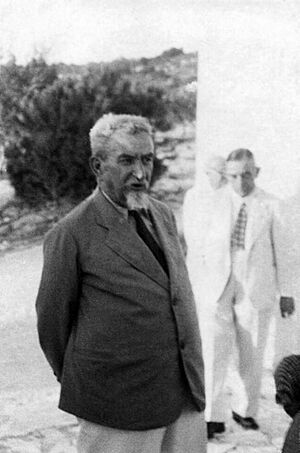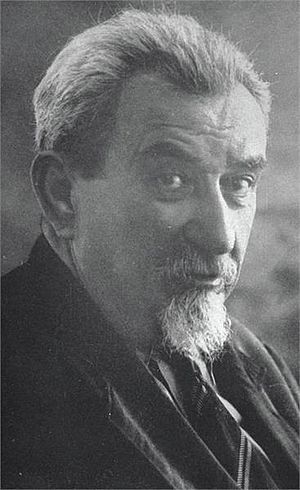Hillel Yaffe facts for kids
Hillel Yaffe (1864–1936) was a Russian Jewish doctor and a Zionist leader. He moved to Palestine during the First Aliyah, which was a big wave of Jewish immigration. He played a huge part in stopping malaria among the Jewish people in Palestine in the early 1900s. He also helped make the healthcare system better for the Yishuv (the Jewish community in Palestine) during that time. The Hillel Yaffe Medical Center in Hadera is named after him today.
Contents
Biography
Hillel Yaffe was born in 1864 in a small village in Ukraine. His father was a rich merchant who made sure Hillel got a traditional Jewish education. As he grew up, Yaffe went to a secondary school. These studies made him want to become a doctor and also brought him closer to the Zionist movement.
After finishing secondary school, he traveled to Geneva to study medicine. Later, he became an expert in eye care in Paris. He started publishing his laboratory work, and his research was well-respected by scientists. Yaffe wanted to be a doctor in the Land of Israel. In 1891, he went to Turkey, which was the center of the Ottoman Empire. There, he got his license to practice medicine. From Turkey, he sailed to Jaffa.
Yaffe married Rivka Glickstein in 1898. She was the sister of Esther Glickstein. Rivka had studied with Yaffe's sister in France before they met. Hillel and Rivka had three children: Yirmeyahu, Sarah, and Ya'akov. Yirmeyahu later became a captain in the Jewish Brigade. Sarah studied farming in England. Ya'akov became a doctor specializing in tropical diseases.
Medical Career
After traveling around the country, Yaffe settled in Tiberias. He worked as a doctor there for two years (1891–1893). Then he moved to Zikhron Ya'akov. He was especially known for his dedicated work for the people of Hadera, who were suffering badly from malaria. He visited Hadera at least twice a week and managed to heal some people. However, many still died.
It became clear that treating individuals wasn't enough. A bigger plan was needed to get rid of malaria from the Jewish settlements. In 1895, Yaffe was asked to become the representative of Hovevei Zion (Lovers of Zion) in Israel. This group supported Jewish settlement in Palestine.
Zionist Leadership
Yaffe decided to combine his medical work with political action. He realized that to help the Jewish settlement in Israel, new organizations were needed. He understood that to stop malaria, he had to treat patients, do research, help the community, and get involved in politics.
When Yaffe took the job with Hovevei Zion, he moved to Jaffa, a central city. He managed to raise money to drain the swamp near Hadera, which was full of mosquitoes. He also traveled to Europe to raise money for other important causes, like saving the first Hebrew school from closing.
Yaffe became a well-known expert on malaria. He published many articles and even gave a speech at an international conference in Paris in 1900. He worked to improve public health and studied other diseases that were spreading. He focused on preventing illnesses and stopping them from spreading.
In 1902, an epidemic of cholera spread through Israel. The Turkish government asked Yaffe to fight the disease. He decided that people could not leave their communities. Also, no one was allowed to enter or leave the house of a sick person. These rules helped stop the illness from spreading.
In 1903, Yaffe joined a group from the Zionist movement. They went to check out the El-Arish region. This area was suggested by Theodor Herzl as a possible location for a Jewish state. In the same year, representatives from Zikhron Ya'akov formed the General Union and Teachers' Union of the Yishuv. Yaffe led these groups. He worked to make the communities stronger so they wouldn't always need money from outside. He also convinced teachers to use the Hebrew language in schools.
In 1905, Yaffe left Hovevei Zion and started working at the Jaffa hospital. While working, he got sick with pneumonia and went to Europe to recover. In 1907, he returned to Israel and began to run the hospital in Zikhron Ya'akov. Yaffe knew how important public health was. He built a wide system for preventing diseases. He trained groups of medical helpers who could assist settlers. These groups spread throughout the land, making healthcare better for everyone.
In 1919, he moved from Zikhron Ya'akov to Haifa. There, he worked as a doctor and wrote medical articles. His articles were published in newspapers outside the country, and he was invited to international medical conferences. Yaffe continued his work until he passed away in 1936. He was buried in Zikhron Ya'akov, as he wished.
Involvement with NILI
Yaffe had a small but important role with NILI. This was a secret Jewish group based in Zichron Ya'akov. They helped the United Kingdom in its fight against the Ottoman Empire in Palestine during World War I, between 1915 and 1917.
Fight Against Malaria
Yaffe's first efforts to stop malaria focused on drying up the swamps. He used many methods. One way was planting many eucalyptus trees. The idea was that these large trees would soak up a lot of water from the ground. People also worked by hand to dry the swamps. The residents of Hadera and workers from Africa (who came after Yaffe asked Baron Rothschild for help) did the hard work of drying the swamps. They dug many canals to connect the swamps to the Hadera Stream.
Another approach Yaffe took was research. He went to Europe and learned new ideas about malaria. One important study suggested that mosquitoes from the Anopheles family, which lived in swamps, carried the disease. He then asked farmers to hang nets around their beds and windows. He also told them to clean up any standing water. Yaffe also convinced Baron Rothschild to send people to kill the mosquitoes. After these efforts, fewer people got malaria. The work to dry the swamps continued with even more effort. Planting many eucalyptus trees near Hadera was a big part of Yaffe's plan to change the environment and fight the disease completely.
See also
- Israel Jacob Kligler (1888-1944), a scientist who led the effort to get rid of malaria in Mandatory Palestine
- Gideon Mer (1894–1961), another malaria expert in Mandatory Palestine
- Healthcare in Israel



